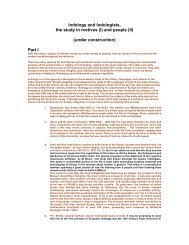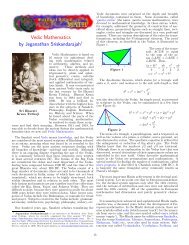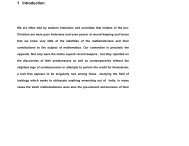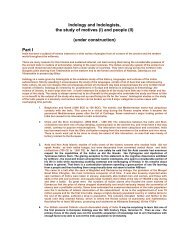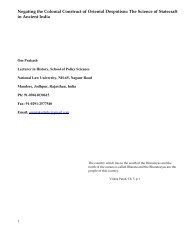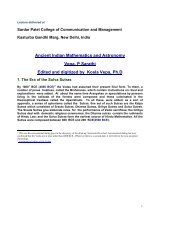The Dhaarmik Traditions - Indic Studies Foundation
The Dhaarmik Traditions - Indic Studies Foundation
The Dhaarmik Traditions - Indic Studies Foundation
You also want an ePaper? Increase the reach of your titles
YUMPU automatically turns print PDFs into web optimized ePapers that Google loves.
(Gita 2.47, 48)<br />
"seek to perform your duty. but lay not claim to its fruits. be you not the producer of<br />
the fruits of karma; neither shall you lean towards inaction."<br />
<strong>The</strong>se are the famous verses in the Gita embodying the concept of Desireless Action.<br />
One is hard pressed to act without any motive. Most are busy either to gain something<br />
or to ward off something unwanted. in the absence of such a motive generally there is<br />
little action.<br />
But Bhagavan induces Arjuna not to be motivated and at the same time to be intensely<br />
active. Yes, here in lies the turning point in life from 'Preyas to Sreyas'.<br />
good accrues from detachment and never from attachment.<br />
Karma (action) in itself is no evil; but it becomes so when mixed up with desire. desire<br />
tainted karma gives continuity to the wheel of birth and death. Conquerors of desire<br />
are they who care not for the fruits of karma. Freedom from desire is real freedom.<br />
When duty is discharged untarnished by desire, clarity of understanding ensues.<br />
karma therefore has to be performed perfectly by the aspirant unmindful of the fruits<br />
thereof.<br />
"a boat may be floating on the water, but no water should be allowed to get into it. man<br />
may live in the world, but no worldly desire ought to take possession of him.<br />
- Sri Ramakrishna Paramahamsa"<br />
how the desireless one works and lives in the world is explained in the next verse:<br />
"perform action, o Dhananjaya, being fixed in yoga, renouncing attachments, and<br />
even-minded in success and failure; equilibrium is verily yoga."<br />
<strong>The</strong> surrendered yogi, the Bhakta holds all the activities taking place in him as the<br />
doings of lord. he places himself in the position of a willing servant, ever ready to<br />
execute orders.<br />
An attitude of this kind eliminates attachment. <strong>The</strong> devoted yogi holds the successes<br />
and failures in his endeavors free from attachment and aversion.<br />
this even-mindedness is equilibrium. he is a yogi who keeps the mind in this poised<br />
76



